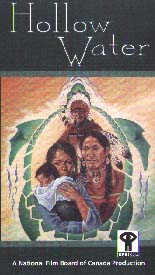|
________________
CM . . . .
Volume VII Number 16 . . . . April 13, 2001
The Hollow Water Reserve is a small Manitoba community of about 450 people. Ten years ago, it
was a community reeling from self-destructive behavior, much of it the result of inter-generational
substance and sexual abuse. Solutions are found when problems are confronted and admitted to,
but how does a small, closely-knit community deal with the results of such disclosures when both
victims and offenders live together? Hollow Water is the story of the community's and, in
particular, one family's attempt to confront and overcome a legacy of abusive behavior. The
community faced many challenges. In an unusual move, the Province of Manitoba's judiciary gave
the community permission to use the sentencing circle, rather than the usual court-based process,
and, in doing so, enabled the people to focus on helping the offenders to confront their problems
and participate in the emotional work which could lead to healing. This approach is the
cornerstone of restorative justice, a concept which focuses on healing, rather than incarceration or
punishment, and which acknowledges the offender's responsibility to his or her victim. Traditional
culture provided the means for healing: elders were invited to undertake their traditional roles as
teachers of belief, ceremony, and ritual, and they became crucial participants.
Not everyone in the community was comfortable with the inevitable disclosures or with the pain
that resulted. No attempt is made to whitewash this aspect of the process, and those who chose
not to accept the traditional process found themselves in the court system, facing incarceration,
and the likelihood of re-offending in the future. But, for this community and the family profiled in
the video, community justice worked, and the process is ongoing.
Hollow Water deals with serious issues: the judicial system, the difficulties faced by some
Native communities--the ongoing trauma of abuse. The film does not detail the nature of
inter-generational sexual abuse; however, the sensitivity of the topic should serve as a caution to
teachers who might use it in senior classes studying Canadian Law, Native Issues, Sociology or
Psychology. As with all such materials, preview before viewing. Anyone showing the film should
provide students with a general overview of the subject matter. Individuals who have been or are
victims of abuse would undoubtedly find it painful to view this film, and even those who aren't,
may find it disturbing. I think that Hollow Water, although well-made and thought-provoking,
might have rather limited application at the high school level.
Recommended with Reservations.
Joanne Peters is a teacher-librarian in Kelvin High School, Winnipeg, MB.
To comment on this title or this review, send mail to cm@umanitoba.ca.
Copyright © the Manitoba Library Association.
Reproduction for personal use is permitted only if this copyright notice
is maintained. Any other reproduction is prohibited without
permission.
Published by
TABLE OF CONTENTS FOR THIS ISSUE - April 13, 2001.
AUTHORS |
TITLES |
MEDIA REVIEWS |
PROFILES |
BACK ISSUES |
SEARCH |
ORDER |
CMARCHIVE |
HOME
|
